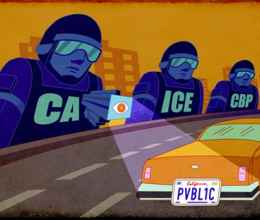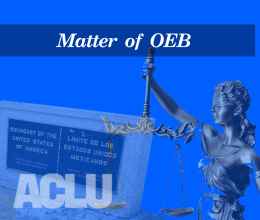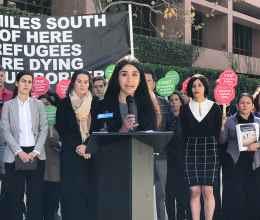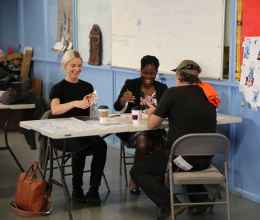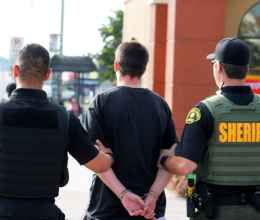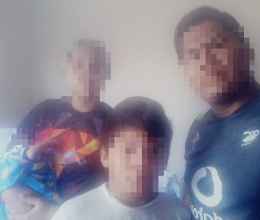By Becca Cramer
California is known for being a leader in protecting the rights of LGBTQ people, women, people of color, immigrants, and other marginalized communities. And while we already have great laws in place, there is still much work to be done – especially now as the Trump Administration begins its attack on the most vulnerable among us.
That’s why, every year, the ACLU of California collaborates with other organizations and lawmakers to draft bills that advance the civil rights and civil liberties of all Californians. When we sponsor legislation, we also coordinate with ACLU supporters, impacted communities, and coalition partners to lobby legislators, testify in support of bills, seek support from other groups, draft fact sheets and sample support letters, and provide communications and media support.
This year, we are sponsoring truly important legislation. Join us in supporting these bills! Together, we can continue championing a government of the people, by the people, and for the people!
This Year’s Sponsored Bills
Criminal Justice
AB 42 (Bonta) and SB 10 (Hertzberg): Bail Reform: Every year in California, thousands and thousands of people are jailed while they await their trial simply because they can’t afford to post bail. In a state where the median bail amount is $50,000, it’s no surprise that many people simply can’t afford to buy their freedom.
When someone is unable to pay the total bail amount up front, they have to make an impossible choice: sit in jail while their case moves forward, plead guilty, or pay a bail bonds company a nonrefundable fee to get out – all this even if they are innocent. AB 42 and SB 10 would help fix that and put freedom and justice within reach for more Californians.
AB 359: Limiting Payments to Jailhouse Informants (Jones-Sawyer): California has a long history of unethical and illegal use of jailhouse informants, which has led to embarrassing scandals, eroded public trust in the criminal justice system, and injustice for both defendants and victims alike. Californians, victims and the accused all deserve a criminal justice system that produces fair and reliable outcomes. AB 359 will help our criminal justice system deliver on this promise. The bill establishes important safeguards to prevent wrongful convictions from occurring and rightful prosecutions from being challenged due to the unregulated and hidden use of jailhouse informants.
SB 180: Repeal Ineffective Sentencing Enhancement Act (Mitchell): The War on Drugs has had devastating and lasting impacts on communities throughout the country. In California, sentencing enhancements, remnants of the failed war, are still in place although they have been proven to be enormously expensive, destabilize communities and families, and contribute significantly to mass incarceration – disproportionately impacting young men and women of color. SB 180 repeals these costly and ineffective sentencing enhancements, reflecting the values of most Californians who think we must divest from mass incarceration in order to invest in vitally needed public services.
Economic Justice
AB 412: No More Bad Credit Because You Can’t Afford to Pay a Ticket (Ting): California’s traffic fines and fees system is a wreck. It prevents people from getting back on track and traps them in a continuous and vicious cycle of debt and poverty. Right now, if someone isn’t able to pay or show up to court for a ticket, an additional $300 penalty is tacked on. This punishes people who can’t afford to pay their original fine. Then courts send the citation to collections agencies, ruining credit records of people already struggling to make ends meet. AB 412 says that individuals who are indigent, facing homelessness, and students on financial aid may be able to have the fee erased due to their inability to pay and requires the courts to send the petition to vacate the fee with each notice for the fee’s collection.
SB 185: No More Suspended Licenses Because You Can’t Afford to Pay a Ticket (Hertzberg): Since 2006, California has suspended approximately 4.2 million driver’s licenses from people that can’t afford to pay a traffic ticket or failed to appear. What starts with a minor traffic violation – or even a jaywalking ticket – quickly turns into hundreds of dollars of debt when excessive fees are automatically tacked on. To make things worse, courts have been requiring payment in full without determining if someone has the ability to pay. With their license suspended, many people cannot get to work and may lose their jobs. Some may even risk arrest for simple things like driving family members to school or the hospital. Due in part to racial bias in traffic stops, this problem disproportionately affects people of color. A recent report found that in many Black and Latino communities, the rate of license suspensions for failure to pay is 3-6 times the state average. SB 185 puts an end to this unfair practice.
Education
AB 1360: Giving Every Student Equal Access to Education (Bonta): All children in California should have equal access to all public educational opportunities, including charter schools. However, some charter schools in California have implemented admissions and disciplinary policies that raise questions and concerns about how and whether students are given equal access to education. AB 1360 limits admissions procedures that exclude students based on academic achievement and ensures constitutional protections for suspension and expulsion proceedings.
Immigrants’ Rights
AB 3: Stronger Public Defenders Act (Bonta): Even a single conviction for a misdemeanor offense can end with someone’s permanent and automatic deportation, regardless of how long that person has lived in the U.S. or whether the person has ties to their community, dependent U.S. citizen children, or served in the military. For many, public defenders are the first line of defense. Unfortunately, many public defenders don’t have access to training and resources on the immigration consequences criminal convictions can have. AB 3 provides state funding so public defenders can give their immigrant clients improved guidance about potential immigration consequences and help prevent avoidable deportations.
AB 208: Second Chances for Immigrants (Eggman): In California, when someone pleads guilty to drug possession but completes court-ordered drug treatment, they can have their conviction dismissed. But federal law does not recognize that and creates a two-tiered system for U.S. citizens and immigrants who still face deportation even after they’ve completed their treatment. AB 208 fixes this problem by allowing people to complete their treatment before entering a plea for minor drug offenses.
SB 31: California Religious Freedom Act (Lara): During the campaign trail, President Trump repeatedly proposed a Muslim registry. Although he hasn’t followed through with this threat yet, he has followed through with two versions of a Muslim ban. We must remain vigilant. Religious freedom is a fundamental right enshrined in our First Amendment. Any attempt to attack this pillar of our democracy is both un-American and unwelcome here in California. SB 31 bars state and local agencies from sharing data with federal authorities for the purposes of compiling a federal registry based on religious belief, practice, affiliation, national origin, or ethnicity. The bill also prohibits state and local law enforcement from collecting information about an individual’s religious beliefs or affiliation, with a few exceptions, such as to provide religious accommodations. The bill demonstrates that, in the face of bigotry, we can reaffirm our common humanity.
Public Health
SB 239: Modernizing California HIV Criminalization Laws (Wiener & Gloria): HIV infection is a public health issue, not a criminal justice issue. Yet California HIV laws are still stuck in the 80s, despite significant scientific advances in the field. These laws further isolate and increase stigma towards people living with HIV, and are significant drivers of the HIV/AIDS epidemic. SB 239 furthers public health goals by ensuring that California treats people living with HIV the same as people living with other serious communicable diseases – instead of singling them out for harsher punishment. California needs to shift gears to create an environment in which all people want and have access to HIV testing, treatment, and other prevention options.
Becca Cramer is the Legislative Coordinator for the ACLU of California Center for Advocacy & Policy.
FOR MEDIA INQUIRIES
Email media@aclu-sdic.org

